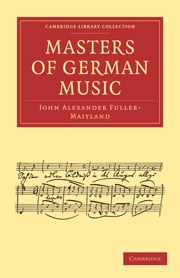Book contents
- Frontmatter
- PREFACE
- Contents
- LIST OF ILLUSTRATIONS
- JOHANNES BRAHMS
- MAX BRUCH
- KARL GOLDMARK
- JOSEF RHEINBERGER
- THEODOR KIRCHNER—CARL REINECKE—WOLDEMAR BARGIEL
- JOSEPH JOACHIM—CLARA SCHUMANN
- HEINRICH VON HERZOGENBERG—HEINRICH HOFMANN—ANTON BRUCKNER—FELIX DRAESEKE
- JEAN LOUIS NICODÉ—RICHARD STRAUSS—HANS SOMMER—CYRILL KISTLER
- Plate section
HEINRICH VON HERZOGENBERG—HEINRICH HOFMANN—ANTON BRUCKNER—FELIX DRAESEKE
Published online by Cambridge University Press: 05 October 2010
- Frontmatter
- PREFACE
- Contents
- LIST OF ILLUSTRATIONS
- JOHANNES BRAHMS
- MAX BRUCH
- KARL GOLDMARK
- JOSEF RHEINBERGER
- THEODOR KIRCHNER—CARL REINECKE—WOLDEMAR BARGIEL
- JOSEPH JOACHIM—CLARA SCHUMANN
- HEINRICH VON HERZOGENBERG—HEINRICH HOFMANN—ANTON BRUCKNER—FELIX DRAESEKE
- JEAN LOUIS NICODÉ—RICHARD STRAUSS—HANS SOMMER—CYRILL KISTLER
- Plate section
Summary
It may be permitted to borrow from a sister art a convenient term that has long been recognised as indicating a class of men, belonging to various schools, whose productions are not striking enough to win them a great name in history, although they contain such excellences as make it impossible to ignore them or to regard them as in a state of pupilage to the school of which they are members. A group of such composers demands notice in any complete account of contemporary art, and it is particularly necessary in dealing with German composers of the present day, since, with the one great exception, the living musicians stand so nearly on a level that to single out a few names for detailed notice would be invidious and unfair. The lovers of the purely classical school, whether in its earlier or later developments, will agree to assign the first place in such a group to Heinrichvon Herzogenberg, who is not only looked upon by German purists as one of the few defenders of the orthodox faith, but is also held up as one of the still fewer converts from a Wagnerism more or less pronounced.
Heinrich von Herzogenberg was born at Graz, June 10, 1843, and after some elementary musical instruction entered the Vienna Conservatorium in 1862, remaining there for three years under the late Otto Dessoff, the well-known conductor of the Frankfort Opera, and a musician of the widest sympathies.
- Type
- Chapter
- Information
- Masters of German Music , pp. 237 - 262Publisher: Cambridge University PressPrint publication year: 2009First published in: 1894



